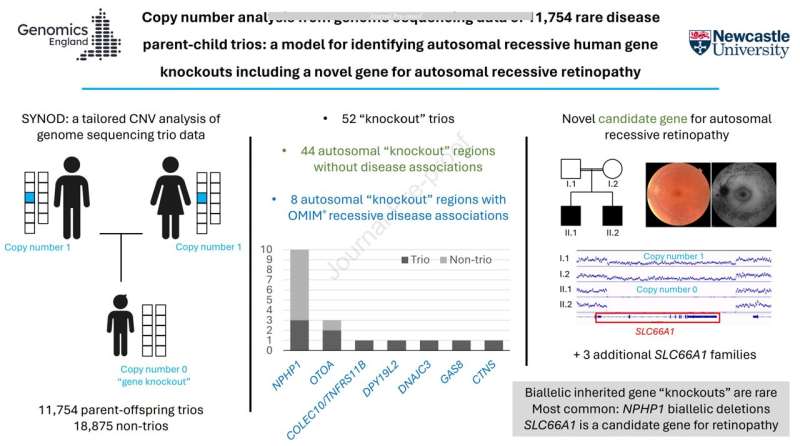This article has been reviewed according to Science X's editorial process and policies. Editors have highlighted the following attributes while ensuring the content's credibility:
fact-checked
trusted source
proofread
New genomic method offers diagnosis for patients with unexplained kidney failure

Scientists have identified a new method of analyzing genomic data in a major discovery that means patients with unexplained kidney failure are finally getting a diagnosis.
Experts at Newcastle University have worked with data from Genomics England 100,000 Genomes project to establish a diagnosis in patients with unexplained kidney failure.
There are numerous reasons for kidney failure, which if left untreated is life-threatening, but often patients do not get a precise diagnosis which can make their best course of treatment unclear.
Missing genetic data
Research, published in Genetics in Medicine Open, has now revealed that, for these patients, areas in their genome are missing and so are not detected as faulty when using the routine genetic pipelines to analyze data.
Scientists say that as this missing gene has now been identified, and mutations within it found, they have been able to classify this as NPHP1-related kidney failure.
Professor John Sayer, Deputy Dean of Biosciences at Newcastle University, said, "Our new genomic methods and their results has huge implications for the patients and families with kidney failure who were previously genetically unsolved."
"What we are now able to do is give some patients a precise diagnosis, which allows their investigations, treatment, and management to be tailored to their needs for the best possible outcomes."
In the study, experts reviewed genetic sequencing data from 959 patients with advanced kidney disease, where a total of 11 patients were identified as having a deleted region genome, leading to a complete loss of a kidney gene that had previously been undetectable.
The new approach was also used to examine genomic data from 11,754 cases to make new genetic diagnoses of 10 other UK patients with unexplained deafness and blindness, again who had previously been genetically unexplained.
Professor Sayer, who is also a consultant nephrologist at Newcastle upon Tyne Hospitals NHS Foundation Trust, added, "We knew that many of our unsolved cases had a genetic disorder, and this new approach enables us to solve these cases definitively."
"We can now give an accurate genetic diagnosis to many more families affected by kidney disease, and our hope is to provide a proper diagnosis for many more families in the future."
"This work is a reminder that it is always worth investigating the underlying reasons for kidney failure to get to the bottom of the condition."
"Finding a genetic cause of kidney failure has huge implications for the patient and also for other family members, especially if they are wishing to donate a kidney to their loved one."
The Newcastle experts are now working with cell lines taken from patients to study more in detail the disease process and to test potential treatments.
Case study: Family finally given answers
The Bingham family has three members, all affected by kidney disease.
Siblings Noah, 23, and Ariel, 19, have both had kidney transplants, and their younger brother, Casper, 15, has been diagnosed with kidney disease.
The family, from Hexham, Northumberland, is part of the Genomics England 100,000 Genomes project and was one of the families identified as having the gene deletion, NPHP1-related kidney failure.
Noah presented with kidney failure just after finishing his A-levels, and at the same time, Ariel was being treated for reduced kidney function.
Both now have donated kidneys as their own organs function reduced to dangerously low levels. Sadly, Noah's transplanted kidney failed after only 16 months, and he had to start hemodialysis again in February this year.
Mum Sarah, 51, a home educator, said, "The genetic tests carried out by Professor John Sayer and his team allowed Casper to receive his diagnosis before he was symptomatic."
"The knowledge that Casper will go into kidney failure and eventually need a transplant, though overwhelming at times, has meant that we can arrange the support he needs and help him prepare for surgery and treatments well before they are necessary."
"When nobody is able to explain why your children are ill, it is very unsettling, with no means of clarifying what might happen in the future. The diagnosis has meant that we have been able to prepare ourselves for the medical issues our children face."
"It's great that this research is being carried out at Newcastle University as it means patients with the condition can get a better understanding of their medical needs, and hopefully, new treatments may be developed in the future thanks to the research that is being done."
Sarah and her husband, Darryl, 52, a chartered building surveyor, have been strong advocates for kidney patients and work with Kidney Research UK to help support patients.
More information: Eric Olinger et al, Copy number analysis from genome sequencing data of 11,754 rare disease parent-child trios: a model for identifying autosomal recessive human gene knockouts including a novel gene for autosomal recessive retinopathy, Genetics in Medicine Open (2024). DOI: 10.1016/j.gimo.2024.101834




















